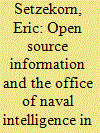| Srl | Item |
| 1 |
ID:
145323


|
|
|
|
|
| Summary/Abstract |
Although post-2006 executive branch efforts to discourage unauthorized disclosures have been politically contentious, historical cases illustrate that the Espionage Act of 1917 has broad utility in prosecuting unauthorized information transfer, also known as “leaking.” Multiple United States federal courts, including the Supreme Court, have consistently upheld the Espionage Act and worked to clarify the statute through judicial interpretation. Late 1930s and early 1940s decisions, including the only Supreme Court hearing on the Espionage Act of 1917, re-affirmed the logic and legality of the Act. The 1941 Supreme Court decision, Gorin v. United States (1941), formed the primary legal precedent for the case of Rosen v. United States (2006), which began the recent U.S. government legal campaign to prosecute the unauthorized release of sensitive defense related information. Specifically, the 1930s cases established that the intent of the government employee, the “sensitivity” of the material transferred, or the status of the recipient were not mitigating factors.
|
|
|
|
|
|
|
|
|
|
|
|
|
|
|
|
| 2 |
ID:
119413


|
|
|
|
|
| Publication |
2013.
|
| Summary/Abstract |
In 1878, Britain developed the first systematic intelligence collection and analysis of China by a Western nation. Undertaken in response to intelligence failure and military defeat, the British Army in India established an intelligence section in Beijing using small numbers of Chinese-speaking British military officers. Their reports reveal their struggles to understand a culture and government radically different than their own and express a strong respect for Chinese military capabilities. The intelligence reports produced are a unique window into British history, intelligence practices and Chinese strategic thinking.
|
|
|
|
|
|
|
|
|
|
|
|
|
|
|
|
| 3 |
ID:
131051


|
|
|
|
|
| Publication |
2014.
|
| Summary/Abstract |
The role of open source intelligence (OSINT) has expanded greatly since 11 September 2001 (9/11) and the 2010-2011 Arab Spring as analysts and policymakers have struggled to understand the challenges and opportunities of globalized information. The contemporary trend toward open source collection and analysis is not fundamentally new in its methods, but rather marks a return to traditional methods of intelligence gathering that have been overlooked in favor of spy satellites, drones, and signal intercepts. Beginning in the early 1900s, the United States Office of Naval Intelligence (ONI) developed an extensive system of open source intelligence collection and analysis. The primary target of the ONI's efforts was the naval development of the Empire of Japan. An exploration of the connections between open source intelligence and the behavior of American negotiators at the Washington Naval Conference of 1921-1922 presents a historical setting for later developments.
|
|
|
|
|
|
|
|
|
|
|
|
|
|
|
|